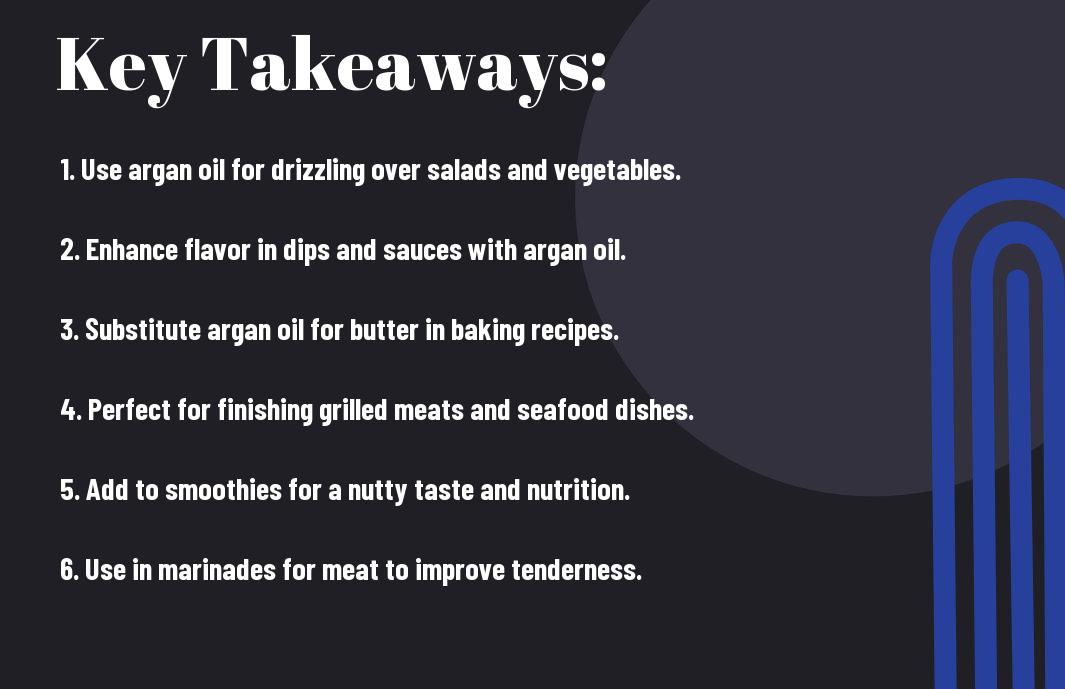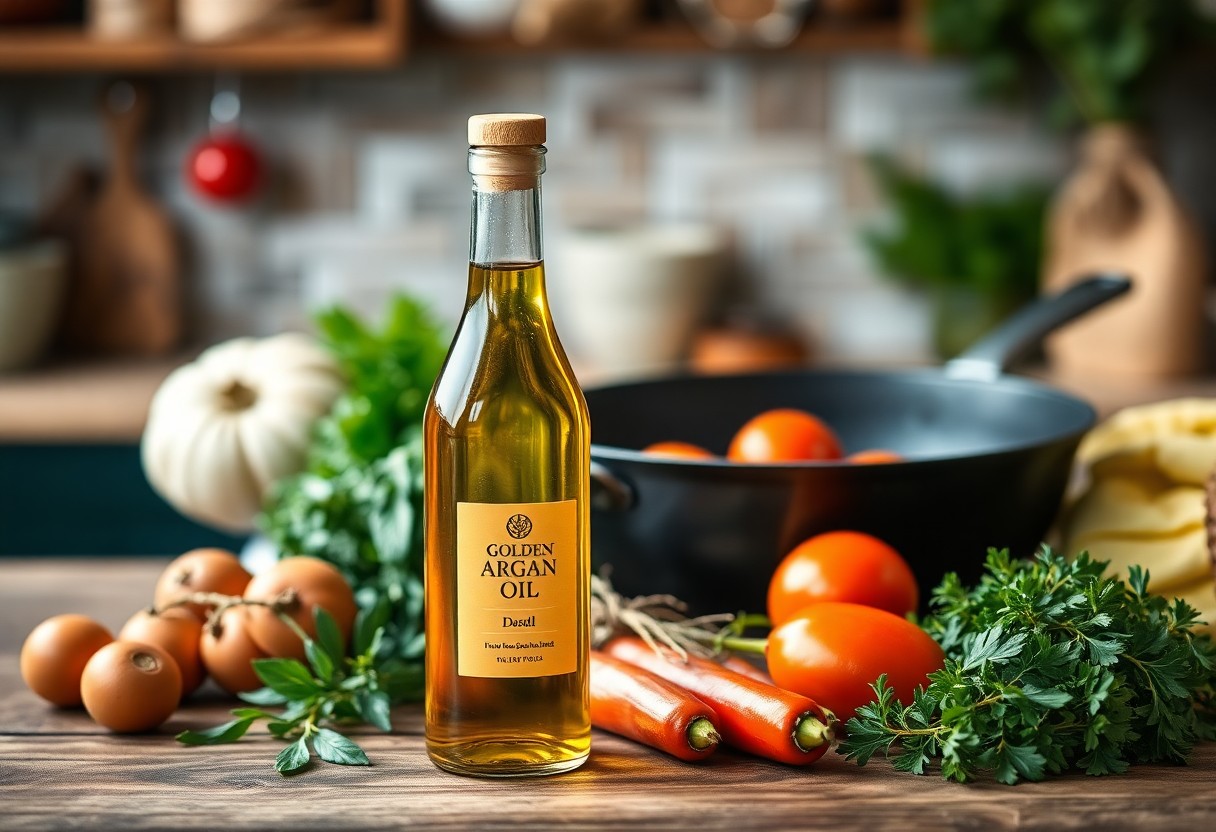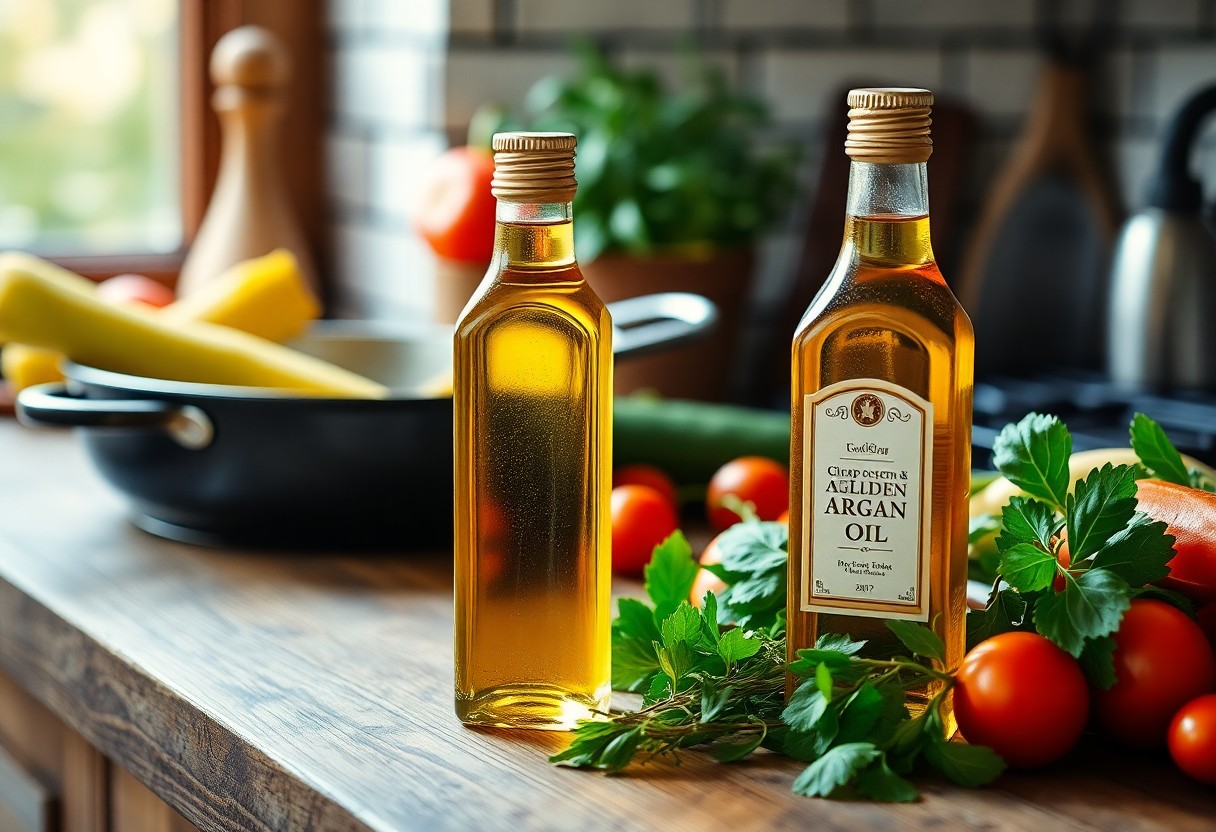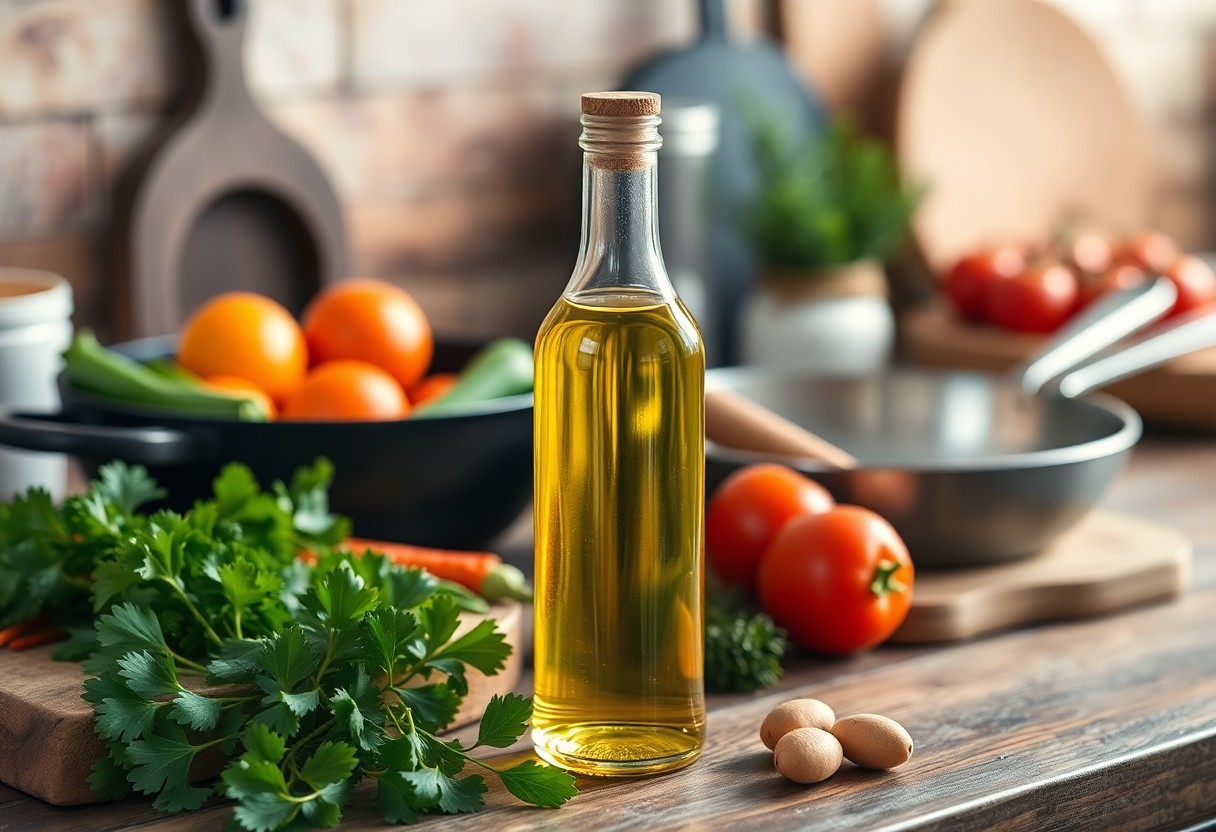Best known for its rich flavor and numerous health benefits, argan oil is a versatile ingredient that can elevate your culinary creations. You can use this precious oil in various ways to enhance the taste of your dishes while reaping the benefits of its nutrients. In this post, you will discover the best methods to incorporate argan oil into your cooking, from dressings to marinades, and learn how it can complement your meals, adding a unique touch to your kitchen repertoire.

Understanding Argan Oil
To appreciate the versatility of argan oil in cooking, it’s imperative to understand its origins and benefits. Derived from the nuts of the argan tree native to Morocco, this oil has been used for centuries, not just in culinary applications but also in beauty and health. Its rich flavor enhances dishes, while its nutritional properties offer you a wealth of health benefits, making it a valuable addition to your kitchen pantry.
What is Argan Oil?
Above all, argan oil is a plant oil extracted from the kernels of the argan tree. It is reputed for its nutty flavor, which makes it an ideal choice for dressing salads, drizzling over dishes, or even as a cooking oil. In Moroccan cuisine, it is a staple ingredient that adds richness and depth to a variety of recipes, reflecting the vibrant culinary culture of the region.
Nutritional Profile of Argan Oil
About argan oil’s nutritional profile, it is rich in beneficial compounds that can support your overall health. The oil contains monounsaturated fats, antioxidants, and imperative fatty acids, making it a heart-healthy choice for your cooking needs.
But beyond just being a flavorful addition, argan oil is packed with vitamin E and phenolic compounds that help combat inflammation and oxidative stress. With a unique blend of omega-3 and omega-6 fatty acids, argan oil promotes cardiovascular health and can contribute to better skin and hair health when used appropriately in your culinary endeavors.
Culinary Uses of Argan Oil
Any home chef can enhance their dishes with argan oil, a versatile ingredient known for its nutty flavor and nutritional benefits. You can drizzle it over salads, use it as a finishing oil for cooked dishes, or incorporate it into marinades and dressings. For more inspiration, check out this Culinary Argan Oil: Recipes and Uses to explore various ways to incorporate this delightful oil into your cooking.
Cooking Methods
One of the best ways to use argan oil in cooking is by applying low to medium heat. This preserves its unique flavor and health benefits, making it suitable for sautéing vegetables or drizzling over roasted meat. However, avoid high-heat cooking to retain its delicate properties and maximize your culinary experience.
Flavor Pairings
By incorporating argan oil into your dishes, you’ll discover its compatibility with a variety of flavors. It pairs well with spices, citrus, nuts, and even earthy grains, enhancing the complexity of your meals.
Also, consider using argan oil alongside fresh herbs such as parsley or cilantro, and don’t hesitate to mix it with ingredients like balsamic vinegar or honey for interesting dressings. Experimenting with these combinations can elevate your culinary creations, providing depth and an exotic twist that your guests will surely appreciate.

Health Benefits of Cooking with Argan Oil
Now, incorporating argan oil into your cooking can provide a myriad of health benefits. Rich in heart-healthy fats, vitamins, and antioxidants, this oil not only enhances flavor but also promotes overall wellbeing. By utilizing argan oil in your meals, you can support your health and enjoy delicious dishes at the same time.
Heart Health
After replacing other cooking oils with argan oil, you may find it beneficial for your cardiovascular health. Its high content of monounsaturated fats, particularly oleic acid, can help to lower bad cholesterol levels, reducing your risk of heart disease. By making this simple swap, you contribute positively to your heart health.
Antioxidant Properties
Around argan oil, you’ll discover a wealth of antioxidants that combat oxidative stress in your body. These compounds, including vitamin E and phenolic compounds, help to neutralize free radicals, which can lead to cellular damage. By incorporating argan oil into your cooking, you not only enhance your dishes but also boost your antioxidant intake for better health.
Antioxidant properties in argan oil can play a significant role in maintaining your overall health. These components help to protect your cells from damage caused by free radicals, which are known to be linked to various chronic diseases. Including argan oil in your diet can assist in reducing inflammation and improving skin health, making it a wise choice for enhancing both your meals and your wellbeing.
Tips for Cooking with Argan Oil
Many chefs and home cooks alike can enhance their dishes with argan oil by following some simple tips. Consider these suggestions:
- Use it as a finishing oil to add a nutty flavor to salads and grilled vegetables.
- Pair it with spices and herbs to create flavorful marinades.
- Incorporate it into dips like hummus for a unique twist.
- Drizzle it over warm dishes to maintain its health benefits.
Recognizing the versatility of argan oil can elevate your culinary creations.
Choosing the Right Type
Along with understanding its culinary uses, choosing the right type of argan oil is vital. Opt for culinary-grade argan oil, which is specifically produced for cooking; it has a lighter color and a milder flavor. Avoid cosmetic grades, as they may not be safe for consumption.
Proper Storage Techniques
Across your kitchen, proper storage techniques will help maintain the quality of your argan oil. After opening, keep the oil in a cool, dark place, away from heat and light, to prevent oxidation, which can lead to spoilage.
Cooking with argan oil requires you to be mindful of its storage conditions to preserve its rich flavor and nutritional benefits. You should use an airtight container, and if possible, store it in the refrigerator for extended shelf life. Always check for any off odors or changes in appearance before using. Properly stored, your argan oil can be a delicious and healthy addition to your meals for months to come.

Recipes Featuring Argan Oil
Keep exploring the versatility of argan oil in your kitchen by incorporating it into various recipes. Its nutty flavor and rich nutrients can elevate everyday dishes, making them healthier and tastier. Utilize argan oil for not only cooking but also enhancing your dining experience through dressings, marinades, and other culinary applications.
Salad Dressings
An easy way to incorporate argan oil into your meals is through homemade salad dressings. Combine it with fresh lemon juice, a touch of honey, and Dijon mustard for a vibrant, flavor-packed dressing that enhances your greens. This oil also pairs well with herbs and spices, allowing you to customize each dressing to your liking.
Marinades and Dips
On the other hand, marinating your proteins or veggies in argan oil results in a delectable infusion of flavor. You can mix argan oil with garlic, fresh herbs, and a splash of vinegar to create a robust marinade for meats or a delightful dip for your favorite veggies.
And don’t hesitate to experiment by adding argan oil to your favorite dip recipes, like hummus or tzatziki. The oil will contribute its unique nuttiness while adding healthy fats, making your dips more satiating and nutritious. Pair these dips with whole-grain pita or fresh veggies to enjoy an elevated snacking experience.

Common Myths About Argan Oil in Cooking
Not everything you hear about argan oil and its cooking properties is true. Many people believe that argan oil is not suitable for high-heat cooking or that it cannot be used in culinary applications. However, understanding the facts can help you incorporate this nutritious oil into your meals with confidence.
Smoke Point Misconceptions
With its versatile composition, argan oil boasts a smoke point of around 420°F (215°C), making it suitable for sautéing and drizzling over dishes. Many assume that this means it is unusable at high temperatures, but that’s a myth. When used wisely, argan oil can enhance the flavor and nutrition of your favorite recipes.
Authenticity of Argan Oil Products
An important aspect to consider is the authenticity of argan oil products. With the rise in popularity of argan oil, it can be challenging to discern quality options from imitations. Opting for certified organic or reputable brands will ensure that what you’re cooking with is genuine and retains the health benefits associated with pure argan oil.
About 90% of commercially available argan oil is produced in Morocco, where it is traditionally derived from the seeds of the argan tree. To ensure you are purchasing authentic argan oil, look for labels indicating it is cold-pressed and organic. If a product is labeled as “argan infusions” or contains additives, it’s likely not the pure form you want for cooking. Checking for certifications such as the COSMECERT and sourcing from reputable suppliers will guarantee the integrity of your cooking oil.
Final Words
With this in mind, you can enhance your culinary creations by incorporating argan oil in various ways, from salad dressings to drizzling over roasted vegetables. Its distinct flavor and health benefits make it a valuable addition to your cooking arsenal. To further explore how you can benefit from this versatile oil, check out What Is Argan Oil and How Is It Used?. By understanding these methods, you’ll maximize your use of this delightful ingredient in your meals.

